
If your business is in the e-commerce industry, you know all too well how much of a role warehousing plays in ground operations. As technology and customer demands are constantly evolving, so must warehousing—but where will it lead? In this blog post, we’ll discuss some interesting predictions and trends that could be on their way to reshape the future of warehouse management as we know it.
Automation and Robotics
One way that warehouses are looking to become more efficient is through the use of automation. Automated systems can help to speed up tasks such as picking and packing orders and can also help to reduce errors. Additionally, robotics can help to reduce errors and improve safety in the warehouse. According to a report from MarketsandMarkets, the warehouse automation market is expected to grow from $16.52 billion in 2018 to $29.03 billion in 2023, at a CAGR of 11.6%.
The Use of Drones
Another form of automation that is beginning to be used in warehouses is drones. Drones can be used for tasks such as inventory management and order picking and can help to improve accuracy and efficiency. According to a report from Zion Market Research, the global drone logistics market is expected to reach $11.2 billion by 2025, up from $2.8 billion in 2016.
Internet of Things (IOT)
The Internet of Things (IoT) is another trend that is set to have a major impact on warehouse management. The IoT refers to the network of physical devices, such as sensors and RFID tags, that are connected to the internet. These devices can be used to collect data about warehouse operations, which can then be used to improve efficiency and accuracy.
On-Demand Services
Another trend that is expected to gain traction in the warehouse management industry is on-demand services. As consumers become more accustomed to receiving goods and services on demand, they will increasingly expect warehouses to be able to meet this demand. This trend will lead to an increase in demand for warehouse management solutions that can provide on-demand services to customers.
Artificial Intelligence (AI) and Machine Learning (ML)
Warehouse management technology is constantly evolving, and the latest trends in the industry are pointing towards the implementation of Artificial Intelligence (AI) and Machine Learning (ML). These technological advancements are set to change the way warehouses operate in the coming years. AI tools can help optimize storage space and automate product tracking, enabling quicker inventory replenishment. Meanwhile, ML algorithms can help warehouses better understand their customers and adapt their operations accordingly.
Sustainability and Environmental Practices
Another trend that is expected to gain traction in the warehouse management industry is a greater focus on sustainability. As consumers become more aware of the environmental impact of their purchases, they are increasingly seeking out products that have been sourced sustainably. This trend is likely to lead to an increase in demand for warehouse management solutions that can help businesses to reduce their carbon footprint.
Improved Tracking and Visibility
Lastly, with the advent of new technologies such as blockchain and the Internet of Things (IoT), it is becoming easier for businesses to track their inventory in real-time. This improved visibility can help businesses to better manage their inventory levels and ensure that products are available when customers need them.
Choose APS Fulfillment, Inc. for Your Warehousing Solution
APS Fulfillment, Inc. offers e-commerce services from Florida that branch out across the country, allowing us to meet yours and your clients’ specific needs. We have years of experience in the supply chain industry and are experts at implementing on-demand warehouse software or working out shipping logistics.
Get in touch with us today and one of our consultants will tailor a fulfillment plan that will help grow your business. To book a consultation, call (954) 582-7450 or email [email protected].





